#adblocking
Explore tagged Tumblr posts
Text
A profoundly stupid case about video game cheating could transform adblocking into a copyright infringement

I'm coming to DEFCON! On Aug 9, I'm emceeing the EFF POKER TOURNAMENT (noon at the Horseshoe Poker Room), and appearing on the BRICKED AND ABANDONED panel (5PM, LVCC - L1 - HW1–11–01). On Aug 10, I'm giving a keynote called "DISENSHITTIFY OR DIE! How hackers can seize the means of computation and build a new, good internet that is hardened against our asshole bosses' insatiable horniness for enshittification" (noon, LVCC - L1 - HW1–11–01).

Here's a weird consequence of our societal shift from capitalism (where riches come from profits) to feudalism (where riches come from rents): increasingly, your rights to your actual property (the physical stuff you own) are trumped by corporations' metaphorical "intellectual property" claims.
That's a lot to unpack! Let's start with a quick primer on profits and rents. Capitalists invest money in buying equipment, then they pay workers wages to use that equipment to produce goods and services. Profit is the sum a capitalist takes home from this arrangement: money made from paying workers to do productive things.
Now, rents: "rent" is the money a rentier makes by owning a "factor of production": something the capitalist needs in order to make profits. Capitalists risk their capital to get profits, but rents are heavily insulated from risk.
For example: a coffee shop owner buys espresso machines, hires baristas, and rents a storefront. If they do well, the landlord can raise their rent, denying them profits and increasing rents. But! If a great new cafe opens across the street and the coffee shop owner goes broke, the landlord is in great shape, because they now have a vacant storefront they can rent, and they can charge extra for a prime location across the street from the hottest new coffee shop in town.
The "moral philosophers" that today's self-described capitalists claim to worship – Adam Smith, David Ricardo – hated rents. For them, profits were the moral way to get rich, because when capitalists chase profits, they necessarily chase the production of things that people want.
When rentiers chase rents, they do so at the expense of profits. Every dollar a capitalist pays in rent – licenses for IP, rent for a building, etc – is a dollar that can't be extracted in profit, and then reinvested in the production of more goods and services that society desires.
The "free markets" of Adam Smith weren't free from regulation, they were free from rents.
The moral philosophers' hatred of rents was really a hatred of feudalism. The industrial revolution wasn't merely (or even primarily) the triumph of new machines: rather, it was the triumph of profits over rent. For the industrial revolution to succeed, the feudal arrangement had to end. Capitalism is incompatible with hereditary lords receiving guaranteed rents from hereditary serfs who are legally obliged to work for them. Capitalism triumphed over feudalism when the serfs were turned off of the land (becoming the "free labor" who went to work in the textile mills) and the land itself was given over to sheep grazing (providing the wool for those same mills).
But that doesn't mean that the industrial revolution invented profits. Profits were to be found in feudal societies, wherever a wealthy person increased their wealth by investing in machines and hiring workers to use them. The thing that made feudalism feudal was how conflicts between rents and profits cashed out. For so long as the legal system elevated the claims of rentiers over the claims of capitalists, the society was feudal. Once the legal system gave priority to profit over rent, it became capitalist.
Capitalists hate capitalism. The engine of capitalism is insecurity. The successful capitalist is like the fastest gun in the old west: there's always a young gun out there looking to "disrupt" their fortune with a new invention, product, or organizational strategy that "creatively destroys" the successful businesses of the day and replaces them with new ones:
https://locusmag.com/2024/03/cory-doctorow-capitalists-hate-capitalism/
That's a hard way to live, with your every success serving as a blinking KICK ME sign visible to every ambitious person in the world. Precarity makes people miserable and nuts:
https://pluralistic.net/2024/04/19/make-them-afraid/#fear-is-their-mind-killer
So capitalists universally aspire to become rentiers and investors seek out companies that have a plan to extract rent. This is why Warren Buffett is so priapatic for companies with "moats and walls" – legal privileges and market structures that protect the business from competition and disruption:
https://finance.yahoo.com/news/warren-buffett-explains-moat-principle-164442359.html
Feudal rents were mostly derived from land, but even in the feudal era, the king was known to reward loyal lickspittles with rents over ideas. The "patents royal" were the legally protected right to decide who could make or do certain things: for example, you might have a patent royal over the production of silver ribbon, and anyone who wanted to make a silver ribbon would have to pay for your permission. If you chose to grant that permission exclusively to one manufacturer, then no one else could make it, and you could charge a license fee to the manufacturer that accounted for nearly all their profit.
Today, rentiers are also interested in land. Bill Gates is the country's number one landowner, and in many towns, private equity landlords are snappinig up every single family home that hits the market and converting it to a badly maintained slum:
https://pluralistic.net/2024/05/22/koteswar-jay-gajavelli/#if-you-ever-go-to-houston
But the 21st Century's defining source of rent is "IP" – a controversial term that I use here to mean, "Any law or policy that allows a company to exert legal control over its competitors, critics and customers":
https://locusmag.com/2020/09/cory-doctorow-ip/
IP is in irreconcilable conflict with real property rights. Think of HP selling you a printer and wanting to decide which ink you use, or John Deere selling you a tractor and wanting to tell you who can fix it. Or, for that matter, Apple selling you a phone and dictating which software you are allowed to install on it.
Think of Unity, a company that makes tools for video-game makers, demanding a royalty from every game that is eventually sold, calling this "shared success":
https://pluralistic.net/2023/10/03/not-feeling-lucky/#fundamental-laws-of-economics
Every time one of these conflicts ends with IP's triumph over real property rights, that is a notch in favor of calling the world we live in now "technofeudalist" rather than "technocapitalist":
https://pluralistic.net/2023/09/28/cloudalists/#cloud-capital
Once you start to think of "IP" as "laws that let me control how other people use their real property," a lot of the seemingly incoherent fights over IP snap into place. This also goes a long way to explaining how otherwise sensible people can agree on expansions of IP to achieve some short-term goal, irrespective of the spillover harms from such a move. Hard cases make bad law, and hard IP cases make terrible law.
Five years ago, some anti-fascist counterdemonstrators hit on the clever idea of blaring top 40 music during neo-Nazi marches, on the theory that this would prevent Nazis from uploading videos of their marches to Youtube and other platforms, whose filters would block any footage that included copyrighted music:
https://memex.craphound.com/2019/07/23/clever-hack-that-will-end-badly-playing-copyrighted-music-during-nazis-rallies-so-they-cant-be-posted-to-youtube/
Thankfully, this didn't work, but not for lack of trying. And it might still work, if calls for beefing up video copyright filters are heeded. Cops all over the place are already blaring Taylor Swift songs and Disney tunes to prevent their interactions with the public from being uploaded:
https://pluralistic.net/2022/04/07/moral-hazard-of-filternets/#dmas
The same thinking that causes progressives to recklessly argue in favor of upload filters also causes them to demand that web scraping be treated as a copyright crime. They think they're creating a world where AI companies can't rip off their creation to train a model; they're actually creating a world where the Internet Archive can't capture JD Vance's embarrassing old podcast appearances or newspaper editorial boards' advocacy for positions they now recant:
https://pluralistic.net/2023/09/17/how-to-think-about-scraping/
It's not that Nazi marches are good, or that scraping can't be bad – it's just that advocating for the use of IP to address either is a cure that's not just worse than the disease – it's also not a cure.
A problem can be real, and still not be solvable with IP. I have enormous sympathy for gamers who rail against cheaters who use aftermarket hacks to improve their aim, see through buildings, or command other unfair advantages.
If you want to tell a stranger how they must configure their PC or console, IP ("any law that lets you control your competitors, critics or customers") is an obvious answer. But – as with other attempts to solve real problems with IP – this is a cure that is both worse than the disease, and also not a cure after all.
Back in 2002, Blizzard sued some hobbyists over a program called "bnetd." Bnetd was a program that provided a game-server you could connect to with the Blizzard games that you'd bought. It was created as an alternative to Battlenet, Blizzard's notoriously unreliable game-server software that left gamers frustrated and furious due to frequent outages:
https://www.eff.org/cases/blizzard-v-bnetd
To the public, Blizzard made several arguments against bnetd. They claimed that it encouraged piracy, because – unlike the official Battlenet servers – it didn't check whether the copies of Blizzard software that connected to it had a valid license key. Gamers didn't really care about that, but they did respond to another argument: that bnetd lacked the anti-cheat checking of Battlenet.
But that wasn't what Blizzard took to the court: in court, they argued that the hobbyists who made bnetd violated copyright law. Specifically, Section 1201 of the Digital Millennium Copyright Act, which bans "circumvention of access controls to copyrighted works." Basically, Blizzard argued that bnetd's authors violated the law because they used debuggers to examine the software they'd paid for, while it ran on their own computers, to figure out how to make a game server of their own.
Blizzard didn't sue bnetd's authors for pirating Blizzard software (they didn't – they'd paid for their copies). They didn't sue them for abetting other gamers' piracy. They certainly didn't sue them for making a cheat-friendly game-server.
Blizzard sued them for analyzing software they'd paid for, while it was running on their own computers.
Imagine if Walmart – one of the biggest book-retailers in America – had a policy that said that you could only shelve the books you bought at Walmart on shelves that you also bought at Walmart. Now imagine that Walmart successfully argued that measuring the books you bought from them and using those measurements to create your own compatible book-case violated their IP rights!
This is an outrageous triumph of IP rights over real property rights, and yet gamers vocally backed Blizzard in the early noughts, because gamers hate cheaters and because IP law is (correctly) understood as "the law that lets a company tell you how you can use your own real, physical property." Hard cases make bad law, hard IP cases make batshit law.
It's more than 20 years since bnetd, and cheating continues to serve as a Trojan horse to smuggle in batshit new IP laws. In Germany, Sony is suing the cheat-device maker Datel:
https://torrentfreak.com/sonys-ancient-lawsuit-vs-cheat-device-heads-in-right-direction-sonys-defeat-240705/
Sony argues that the Datel device – which rewrites the contents of a player's device's RAM, at the direction of that player – infringes copyright. Sony claims that the values that its programs write to your device's RAM chips are copyrighted works that it has created, and that altering that copyrighted work makes an unauthorized derivative work, which infringes its copyright.
Yes, this is batshit, and thankfully, Sony has been thwarted in court to date, but it is steaming ahead to the EU's highest court. If it succeeds, then it will open up every tool that modifies your computer at your direction to this kind of claim.
How bad can it be? Well, get this: the German publishing giant Axel Springer (owned by a monomaniacal Trumpist and Israel hardliner who has ordered journalists in his US news outlets to go easy on both) is suing Eyeo, makers of Adblock Plus, on the grounds that changing HTML to block an ad creates a "derivative work" of Axel Springer's web-pages:
https://torrentfreak.com/ad-blocking-infringes-copyright-ancient-sony-cheat-lawsuit-may-prove-pivotal-240729/
Axel Springer's filings cite the Sony/Datel case, using it to argue that their IP rights trump your property rights, and that you can only configure your web-browser, running on your computer, which you own, in ways that it approves of.
Axel Springer's war on browsers is a particularly pernicious maneuver, because browsers are the best example we have of internet software that serves as a "user agent." "User agent" is an old-timey engineering synonym for "browser" that reflects the browser's role: to go out onto the web on your behalf and bring back things for you, which it displays in the way you prefer:
https://pluralistic.net/2024/05/07/treacherous-computing/#rewilding-the-internet
Want to block flickering GIFs to forestall photosensitive epileptic servers? Ask your user agent to find and delete them. Want to shift colors into a gamut that accounts for your color-blindness? Ask your user-agent:
https://dankaminsky.com/2010/12/15/dankam/
Want to goose the font size and contrast so you can read the sadistic grey-on-white type that young designers use in the mistaken belief that black-on-white type is "hard on the eyes"? That's what Reader Mode is for:
https://frankgroeneveld.nl/2021/08/24/most-underused-browser-feature/
The foundation of any good digital relationship is a device that works for you, not for the people who own the servers you connect to. Even if they don't plan on screwing you over by directing your user agent to attack you on their behalf right now, the very existence of a facility in your technology that causes it to betray you, by design, is a moral hazard that inevitably results in your victimization:
https://pluralistic.net/2023/08/02/self-incrimination/#wei-bai-bai
"IP" ("a law that lets me control how you use your own property") is a tempting solution to every problem, but ultimately, IP ends up magnifying the power of the already powerful, in contests where your only hope of victory is having a user agent whose only loyalty is to you.
The monotonic, dangerous expansion of IP reflects the growing victory of rents over profits – income from owning things, rather than income from doing things. Everyday people may argue for IP in the belief that it will solve their immediate problems – with AI, or Nazis, or in-game cheats – but ultimately, the expansion of a law that limits how you can use your property (including your capital) to uses that don't threaten neofeudalists will doom you to technoserfdom.

Support me this summer on the Clarion Write-A-Thon and help raise money for the Clarion Science Fiction and Fantasy Writers' Workshop!

If you'd like an essay-formatted version of this post to read or share, here's a link to it on pluralistic.net, my surveillance-free, ad-free, tracker-free blog:
https://pluralistic.net/2024/07/29/faithful-user-agents/#hard-cases-make-bad-copyright-law
#pluralistic#torrentfreak#sony#axel springer#germany#copyright#copyfight#felony contempt of business model#bnetd#computer programs directive#eu#datel#cjeu#ip#adblocking#adblock plus#eyeo#bgh#action replay#feudalism#capitalism#rents#profits
977 notes
·
View notes
Text
Privacy is in a terrible situation right now.
Especially on the internet. You know, Google, Facebook, Microsoft, Twitter(X), Apple, and even Tumblr all collect information about you to show you scarily accurate advertisements among other things.
Why does this matter?
This isn't about hiding information, it's about protecting information. You wouldn't let me know your entire life, your diary, all your photos and text messages, so why do you let random companies do the same?
Privacy Guides - Why Privacy Matters
So how do you stop this?
You can't. But you can lessen this. So I'm going to show you a non-exhaustive list of what I've used and what I know of that may help your privacy. I would recommend you go to privacyguides.org after if you want a better explanation. I'm just here to show you cool things.
Disclaimer
I am not a library on this sort of information and this is what I choose to use. I may be incorrect and you may have differing opinions. Also, this may be too extreme for everybody. Use what works for you. Again, I would recommend you go to privacyguides.org after you read this for a more in-depth and better explanation.
VPNs
You know what a VPN is. You've seen the sponsorships. VPNs are one of the most popular privacy tools, but know that they are not the only tool that you'd need. This list is evidence of that.
I would recommend Proton VPN, Mullvad, and IVPN for most users, as they provide a far better amount of privacy and features than VPNs such as Nord VPN, Surfshark, and Express VPN. If you really want unlimited devices go with Windscribe.
I personally use Proton VPN due to the fact that I use their other services.
Browsers
You should probably know that Google Chrome is basically spyware at this point. The issue here is, almost all Chromium-based browsers are. These include, Edge, Opera, and Vivaldi. The only real exception would be Brave, but they've got leadership issues, which may not be a deal breaker for you.
So what do you use? A Firefox-based browser. This obviously includes Firefox, but most Firefox-based browsers are privacy-focused. The browsers that I recommend are Firefox, Librewolf, the Mullvad Browser, Waterfox, and Brave.
There is also the Tor Browser, but that is a whole 'nother can of worms that I will not go into. All I will say is that if you are in a high-risk environment(such as an oppressive regime) or you need absolutely no one to know that you searched that one thing, you may want to use the browser for anonymity.
I use Firefox as my main browser, with Brave as the browser that I use if something doesn't work on Firefox. I also use Tor if it is a high-risk situation.
Search Engines
Google, Bing, and Yahoo! all log your searches, you need alternatives. This is relatively straight-forward.
I recommend, Qwant, DuckDuckGo, SearXNG, Brave Search, and Startpage. Both Qwant and DuckDuckGo are fairly similar as they both use Bing search results and say that they don't track you. SearXNG is more complex, and I will not go into detail here. If you really want Google search results, use Startpage. And if you don't want your search to rely on Bing or Google, use Brave Search.
I use Qwant, mainly just cause its European.
Passwords
Passwords are the keys to your digital life. And most of the time they're not that great. You know the drill here, make passwords like this- XmaE7PEj2hq9ed$w - but you can't really remember them. For that you need a password manager.
I recommend Bitwarden, Proton Pass, and KeepassXC. Bitwarden and Proton Pass are more convenient, but you are trusting a single entity, reputable ones, but still. KeepassXC isn't as convienent, but you have near full control over what happens to it.
I use Proton Pass, as I use other Proton services.
Email
Email is identity, you almost always use your email in order to register for sites like Tumblr, and sites that aren't anything like Tumblr. Companies like Google, Microsoft, and Yahoo! all use your email inbox in order to gain more information about you for their companies. There are quite a few email providers, but I've only used and recommend two.
I recommend Proton Mail and Tuta Mail. Both are good email providers, although Proton would be better if you use other Proton services, like I do.
I use both Proton Mail and Tuta Mail for separate email addresses.
Aliases
Email Aliases are also very important for private email. Your email is your name, if you want to private, you'd go under pseudonyms. That's what email aliases are.
I recommend and have used Simplelogin and Firefox Relay. Email providers like Proton and Tuta also give you aliases when you pay. I don't know how well these work, but I assume that they work the Same as Simplelogin and Firefox Relay.
I use Simplelogin.
Devices/OSes
Phones
Now let's turn up the extremity to 11 as we look at your devices. Phone-wise, avoid Apple, they say that they care about your privacy, but they don't. Apple is better than Google, but I'd only recommend using an iPhone if you already have one, and it still has support left. If that's the case, then follow privacy guides like this one by Techlore(His channel is also really great for privacy guides). You should probably use a Google Pixel. Sounds weird as it's owned by GOOGLE, one of the companies that we don't want to be tracked by, but if we go with the Pixels we can use custom ROMs.
Most ROMs exist for your privacy, they are based on the Android Open Source Project(AOSP) which means they can run most of your favourite Android apps without messing them up with Google. In order to run most of your apps however, you're going to need some way of running Google Play Services. This is a backbone black-box that Google forces most of your apps to use in order to function. CalyxOS and LineageOS with MicroG both have MicroG, an open source implementation of Google Play Services. GrapheneOS just straight up uses Google Play Services but sandboxes it so that it can't get its tentacles all up in your phone.
I recommend going like this:
You have a modern-ish Google Pixel phone, go with GrapheneOS.
You don't have a Google Pixel, but your phone is still supported by CalyxOS, go with CalyxOS.
Your phone isn't supported by either of these but still is supported by LineageOS with MicroG, go with LineageOS.
Your phone isn't supported by any of these, you can do as much degoogling as you can.
Techlore also has a fantastic guide on Android Privacy.
Desktops/Laptops
Apple isn't actually that bad here, its better than Windows at least. But Linux is KING when it comes to privacy and security. There is definitely a learning curve here. Pin the terminal, you're going to use it a LOT. Also be aware that on Linux you won't have every single app that you're used to. If you don't really want that hassle, just go with Mac.
Linux distros that I recommend(for beginners) are: Ubuntu, Linux Mint, Pop!_OS, and Elementary OS.
I use Ubuntu as it's the only one that I could get working on my computer.
Other Pieces of Advice
Use an Ad-blocker! Ads are terrible for privacy as companies can get their trackers in completely unrelated sites via their ads. I use and recommend uBlock Origin.
Don't use any personally identifying information online. Don't use your real name, a picture of you, your voice. The less you give to the internet, the more private you are.
Mix and Match! Explore what works for you. You might be okay with changing OSes but you might be a bit too reliant on GMail. That's fine! Just use what works.
Again, please go to privacyguides.org after this. This did not even scratch the surface but I hope this was useful to you in some way.
#original#internet privacy#internet#google#microsoft#facebook#meta#twitter#privacy#search engines#browsers#duckduckgo#linux#adblocking#adblock#vpn#proton#simplelogin#tuta#tutanota#apple#hope this helped!
272 notes
·
View notes
Note
Do you have a more up to date link for a hacked spotify for android? I found your post from 2022 but the link doesn't have a version that's up to date with the version of spotify I have.
Thanks 💚
Not exactly. I actually don't use the hacked Spotify app anymore. I prefer Spotube, a free open-source app that interfaces directly with the Spotify web API. It also let's you download songs and albums directly, which the hacked app didn't do!
Overall Spotube is more stable, trustworthy (because the code source is open and community-audited), and will never be at risk Spotify patching the hack or disabling your account for violating terms of service, because it uses 100% legal software.
(P.S. the first link leads to F-Droid, an alternative app store for free, community-driven, open-source apps. That's where you can also download NewPipe, my favorite ad-free youtube app.)
#Spotify#Foss#Fossware#Libre#open source#Open-source#FLOSS#Spotube#Ad free#Adblocking#Adblocker#Ad free Spotify#Spotify Premium#Spotify ads
184 notes
·
View notes
Text
This blog post I found via Reddit is really interesting and explains what is happening with the conflict between google's attempts to create an adblocker-blocker on youtube and uBlock Origin's valiant fight to keep on blocking ads.
47 notes
·
View notes
Text
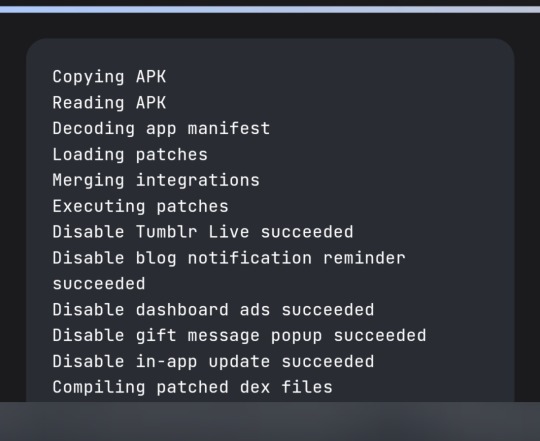
Just updated my Tumblr Android app to disable Tumblr live, disable the reminder to turn on notifications, get rid of all ads, turn off the reminder to buy gifts, and stop the app from updating on its own using ReVanced manager. Finally this hellsite will be fully usable on my phone.
If you want to do this, should build the APK yourself. Don't try to download pre patched apks from third party websites as they could have been tampered with. Here's a Reddit guide on how to do it for blocking ads on YouTube. You can then do it on Tumblr by downloading a Tumblr apk and going through the same process.
https://www.reddit.com/r/revancedapp/comments/xlcny9/revanced_manager_guide_for_dummies/
18 notes
·
View notes
Text
had this lying about and figured itd be good to put here, those of you on android who use youtube, do this! other apps too, but this tutorial is for youtube. its the same basic steps. you got this.
the tutorial is markdown formatted, even though tumblr doesnt use markdown. sorry! it wasnt ment for this site, and the only changes i made were updating information. i wanted to be quick about it.
eta: this may not work on all devices. if it aborts, sorry. try revanced builder. its more difficult to use, but seems to work even when the manager fails. i dont have a gide for it yet, but the link has instructions.
this is a sequel to my general adblocking guide for android
Goodbye Vanced, hello ReVanced!
1. Install ReVanced Manager: https://github.com/revanced/revanced-manager
2. Install Vanced MicroG: https://www.apkmirror.com/apk/team-vanced/microg-youtube-vanced
3. Open the manager, switch to the "patcher" tab, and find the reccomended version (ex: `18.23.35`)
4. Go to APKMirror and download the Universal APK (not bundle) for that version (ex: https://www.apkmirror.com/apk/google-inc/youtube/youtube-18-05-40-release/youtube-18-23-35-2-android-apk-download/)
5. Go to *⚙️ Settings > Apps > See all apps > YouTube* and tap **🚫 Disable** (optional)
6. Go to *App details* and tap **Uninstall** (optional)
7. In ReVanced Manager, go to *🔧 Patcher > Select an application > __💾 Storage__* and pick the downloaded YouTube APK (ex: `com.google.android.youtube_18.23.35-1538252224_minAPI26(arm64-v8a,armeabi-v7a,x86,x86_64)(nodpi)_apkmirror.com.apk`)
8. In *Select patches*, tap **Recommended** a few times to make sure you have 50+ patches selected
9. Tap *✔️ Done > 🔧 Patch > Install > Install anyway*
#o#t#x#adblocker#adblocking#revanced#youtube#android#<-normal readable tags to actually help people find this post...
18 notes
·
View notes
Text
Okay, so about Youtube Ads:
I've reblogged a couple of posts about solutions which help, but fundamentally, right now, it's a game of whack-a-mole, and you may find it too damn tedious to keep reinitialising your shields. So I'm going to share another solution, which is the one I am using at the moment.
Firstly, you want the Redirector extension for your browser:
https://addons.mozilla.org/en-GB/firefox/addon/redirector/
https://chrome.google.com/webstore/detail/redirector/ocgpenflpmgnfapjedencafcfakcekcd (please just switch to firefox for god's sake)
This is an extension which will take any URL based on a pattern you specifiy and replace bits of it to something else. Then, you want to create a redirect like this:

What this does is take any URL which starts with "https://www.youtube.com/watch*" and replace the "youtube.com" with "piped.video" -- this means that any time you go to an individual youtube video page, it'll drop you onto that same video playing via Piped, which is a replacement Youtube frontend without ads.
One caveat: due to some odd aspect of how the Redirector extension works, this won't work if you just click on a video and open it in your current tab. You'll have to either open it and then refresh your browser, or better yet just open it in a separate tab.
Second thing to note is that videos you view this way will not appear in your Youtube history, so if you make heavy use of that to find stuff you half-watched, that may be a nuisance for you.
11 notes
·
View notes
Text
does anyone have a solution to youtube ads showing up with ublock origin???
the ad itself is blank, except for the skip button. i also have privacy badger and sponsorblock installed.
additionally, i am using firefox + duck duck go
10 notes
·
View notes
Text
tumblr dot com can eat a dick if they think i'm disabling my adblocker or paying $5 a month to go ad-free on this shit website.
2 notes
·
View notes
Text
As someone who works semipro for ABP and as a significant volunteer for AdGuard and uBlock Origin, I approve of this power move. 🧚♂️😎

22K notes
·
View notes
Text
Also I've said this before but advertising is an industry that should be considered as pointless and harmful as fossil fuels.
#cosas mias#'oh but if ads were unintrusive I would turn off my adblock' I wouldn't#I hope all marketing and advertising is banned and all we have is socialist murals and public services announcements (unironically)
71K notes
·
View notes
Text
I still think the most devastating enshittification I've ever seen has been picrew. One of the few dress-up game websites left that's not flash-based and it's become DRENCHED in ads. You can't open the home screen without being blasted by at least three or four ads. You can't open two picrews in a row without watching a video ad first. When you have a picrew open the ads cover up the different options and sometimes even stack on each other so you have to hit like 2 or 3 different x buttons to get it to go away, only for more to appear seconds later. Evil world
#cricket chirping#picrew#I only ever use it on desktop these days since I have an adblocker there#But god forbid I wanna casually throw one together on my phone#I don't know if the new app has ads or not but tbh idk if I wanna know. The website is bad enough
30K notes
·
View notes
Note
Thank you so much for telling everyone a lot Blockada. I had never heard of it until now and holy shit. Literally the only ads on Tumblr mobile it doesn't block are the ones from actual accounts (which are still annoying but less frequent) and goddamn the app is actually usable now.
Right?? I don't know how the average American survives with the ads being shoved at us 24/7
So while I have you here, switch to Firefox now and install the uBlock Origin extension to block ads fucking e v e r y w h e r e
#Blokada#Adblocking#Adblock#UBO#Ublock Origin#Ublock#Ad free#Ad-free#Ads#Capitalism#Fuck capitalism#Fuck tumblr#Tumblr#Tumblr live#Tumblr ads#Advertising
25 notes
·
View notes
Text
You shouldn't trust any site that asks you to turn off an adblocker. Not even "reputable" sites like Youtube.
That's because adblockers are an important safety tool for your browser, maybe the most important thing you can do to secure your web browser.
This is because of "Malvertising", one of the most common ways for malware to spread. This is because it is very easy for criminals to pay to place malware infected ads into the big online advertising networks, such as the one Google operates. This can place their malware on otherwise reputable sites who use these networks. And it's well-established you don't even need to click on the ad to get infected, both the wiki page linked above and this Wired article talks about it.
The ad networks have mechanisms for detecting such malvertising, but like antivirus in general, they are inherently limited. The programs can't flag malware that isn't already in their databases.
All the big advertising networks have problems with malvertising, including Google ads which have been infected many times.
The only good solution for the enduser is to block ads entirely in their browser. Ads are both annoying and a dangerous malware vector, not worth it at all.
Google now trying to block adblockers on Youtube and demanding that users turn them off is even more grotesque in light of this. It's like asking you to turn your firewall.
What to do
Ublock Origin is the most reputable adblocker. It doesn't just block ads, it also blocks non-advertising
Part of this is that unlike Adblock Plus or Brave Browser's built-in adblocker, Ublock actually blocks all ads it can and doesn't fund itself by taking bribes from advertisers to show users "acceptable ads."
I linked to the Firefox Addon page for Ublock origin above, because Ublock Origin works best on Firefox, which is the opinion of the Ublock Origin developers and they explain why in technical detail on the project's github page.
So stay safe online, use Ublock Origin and use it on Firefox so it works the best it can.
For youtube specifically, you need to keep your UBO filters updated and clear your chaches, there are threads on the official UBO subreddit with instructions and explanations.
27 notes
·
View notes
Text
so i keep getting this ad, right?
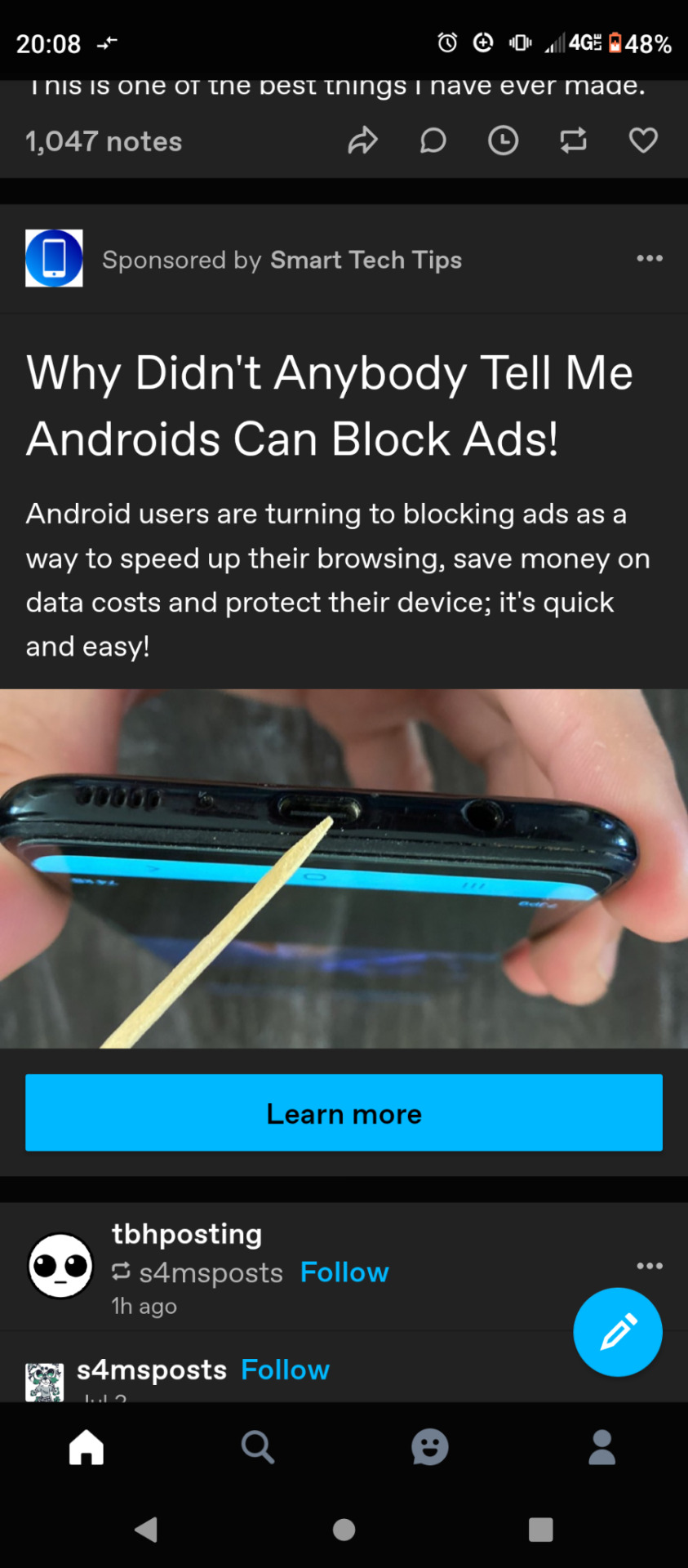
and if you click the link it takes you somewhere and theyre telling you to install an app and alll that.
thats dumb. dont do that.
instead, youre going to wand to open up your settings right,
then youre going to want to navigate to "network and internet"
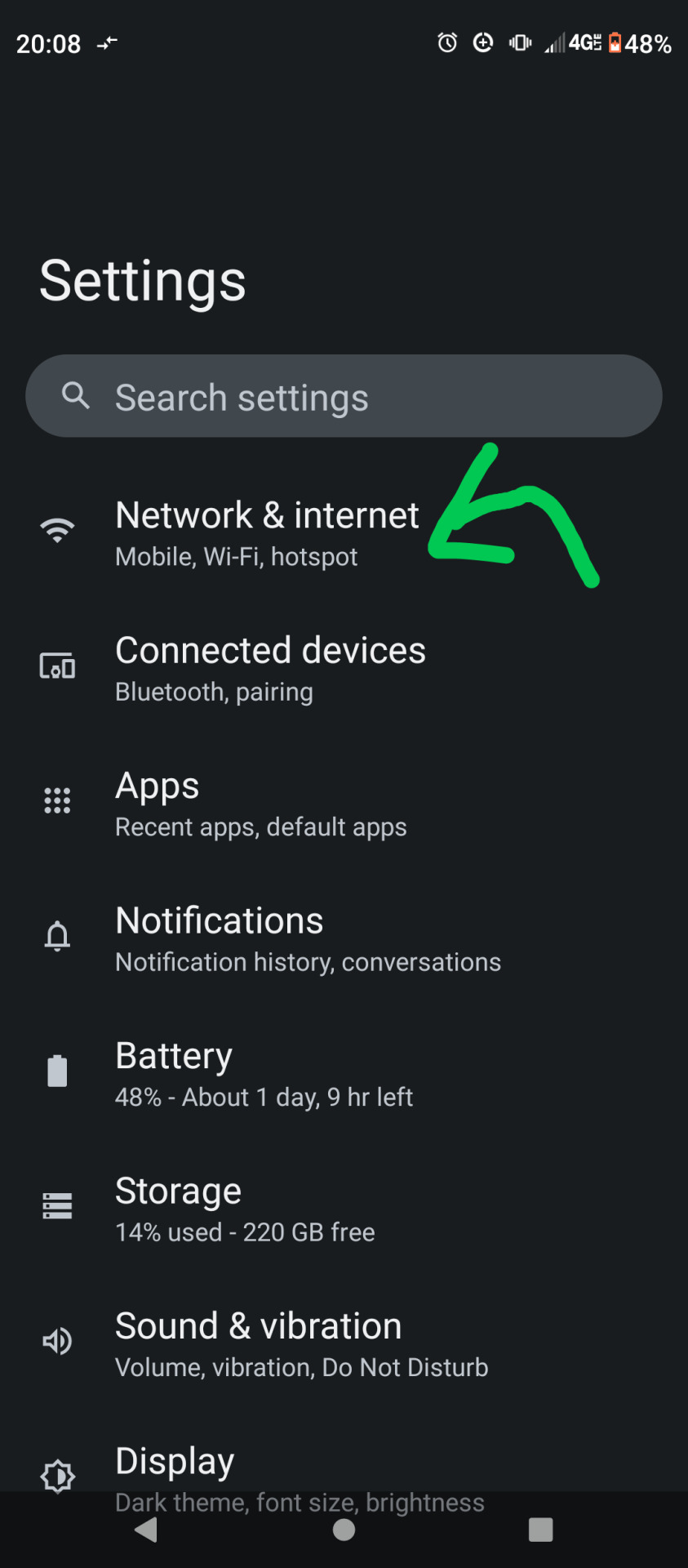
after that, youll want to click on "private dns"
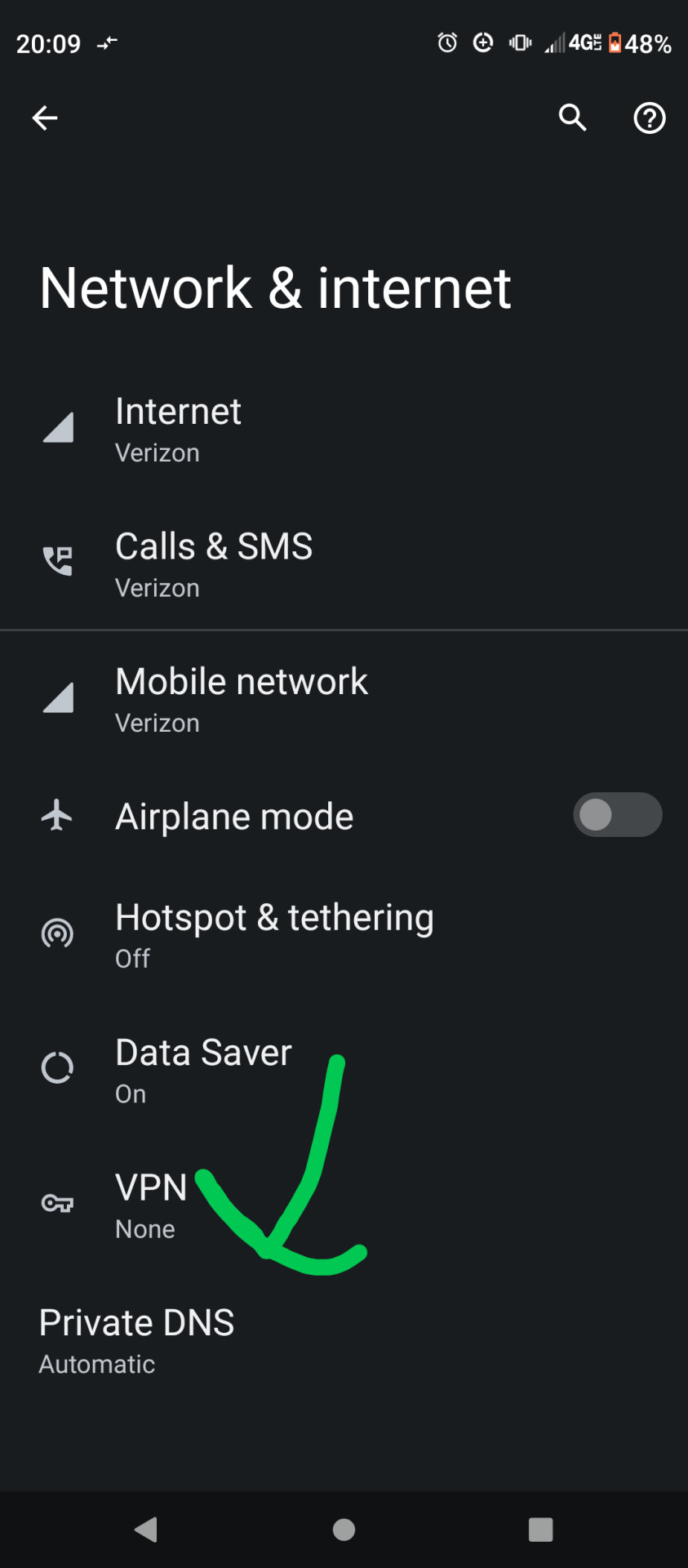
then toggle over to "private dns provider hostname," put in "dns[dot]adguard-dns[dot]com" and hit save
(formatted like that so it wont become a link)
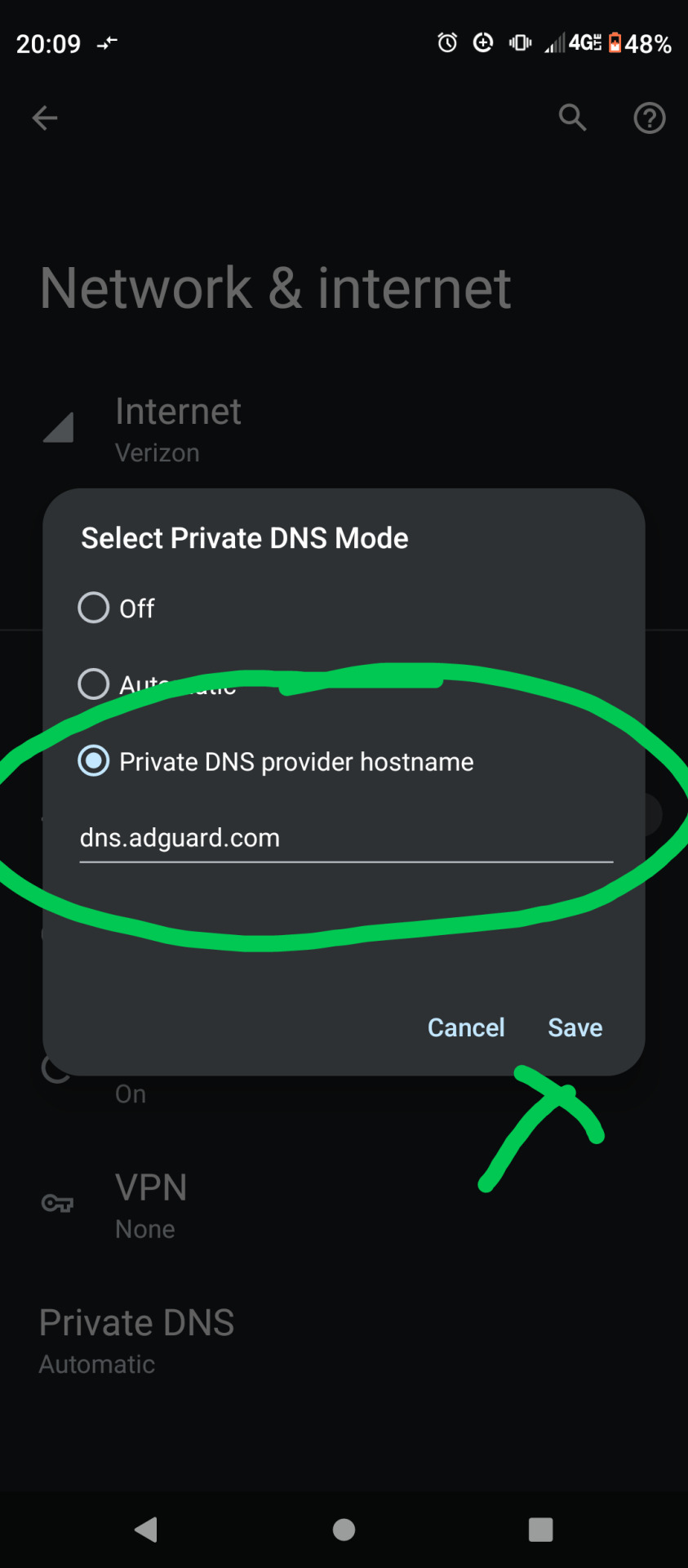
and tada, thatll block just as many ads as the app will, since its tte same tech doing the blocking.
but thats not all! you can go further!
lets say, for example, you find a website that serves content from the same place it serves ads. not super uncommon as its a way to avoid this style of adblocking.
well, theres a simple solution to that as well.
firstly, youre going to want to download firefox or a fork thereof (i use mull, personally)
then, youll want to open up the meatball menu and click "addons"

(screen blacked out because of privacy settings, dw theres nothing important there)
the addon you want is "ublock origin," you may recognize it as the adblocker you should also get on your computer
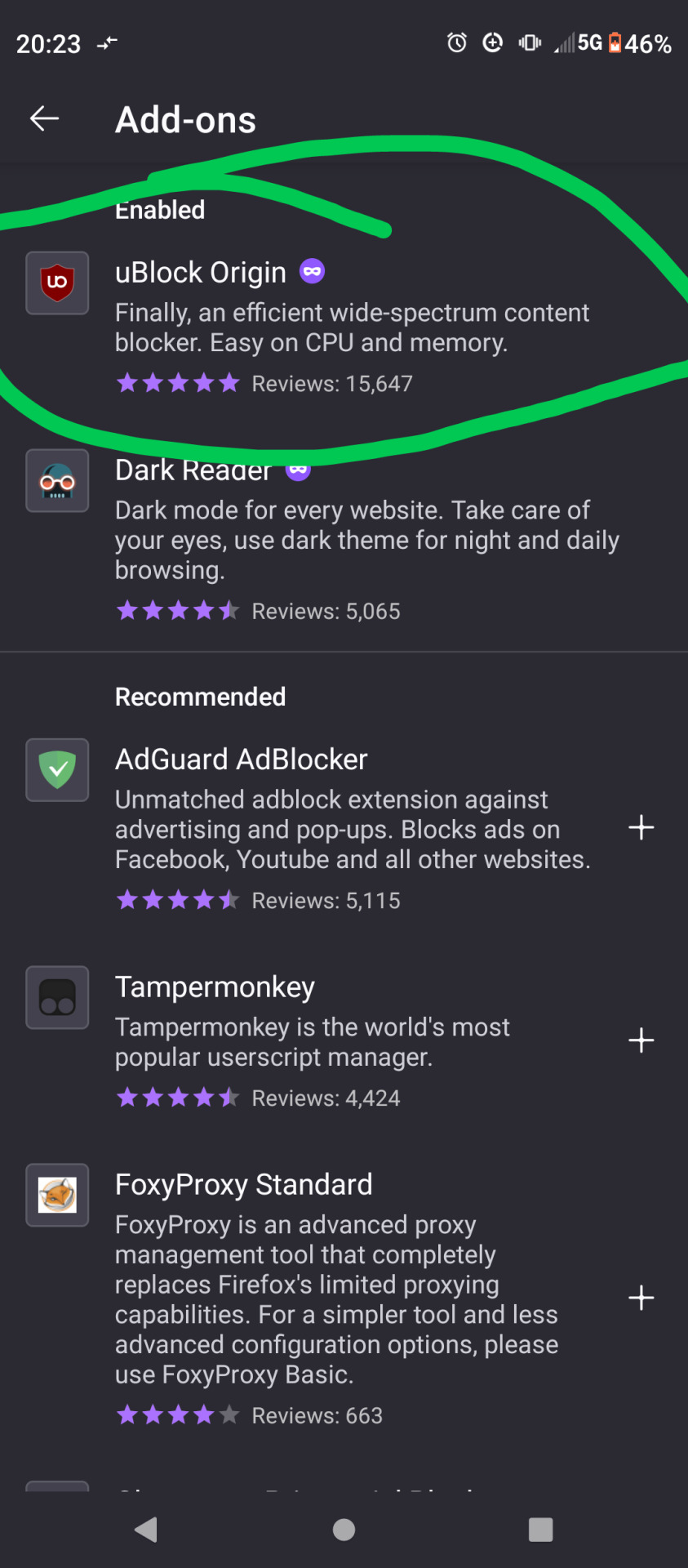
now, i already have it so ill demonstrate the install wit adguard, though not that having more than one adblocker can actually maje things worse. you only need ubo
youre going to want to tap on that little plus icon next to the extension you want
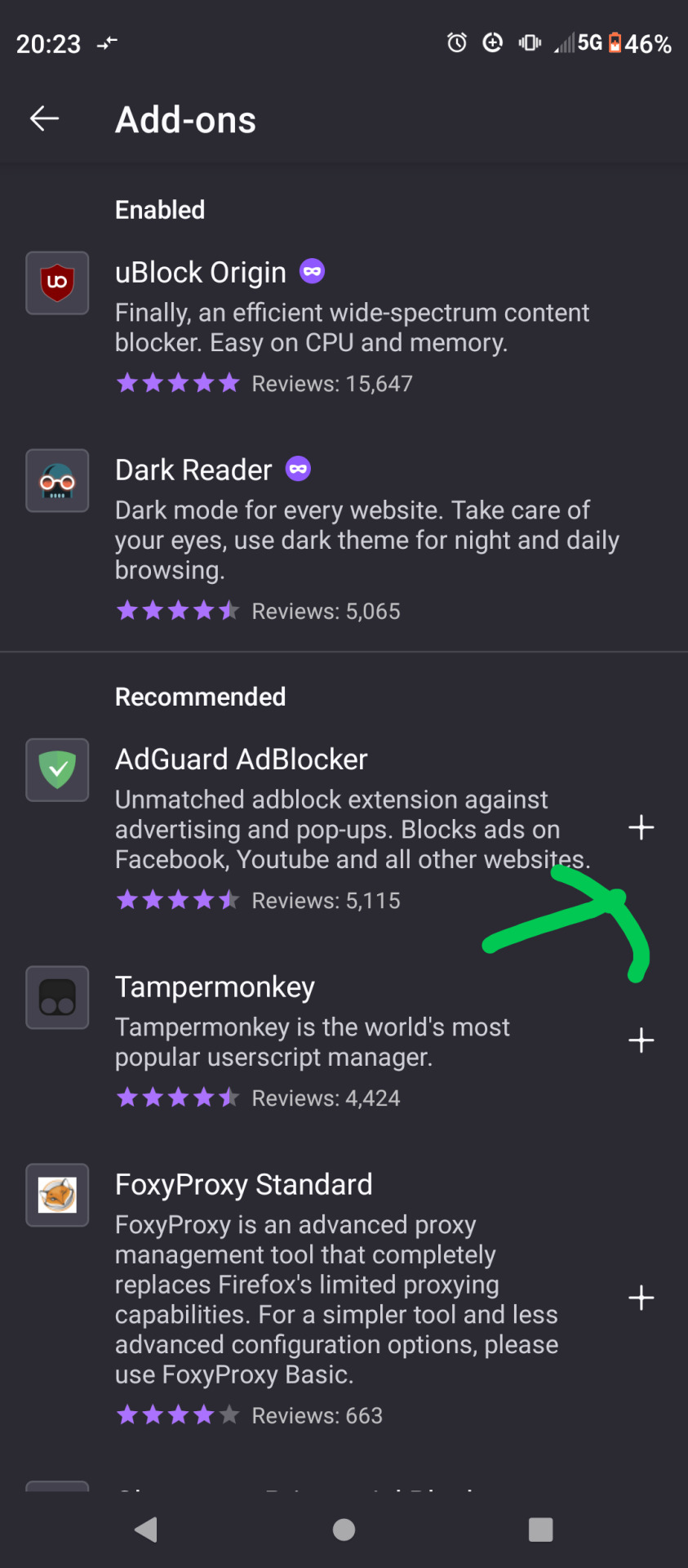
then hit "add"

then after it installs check "allow in private browsing" and "ok, got it"
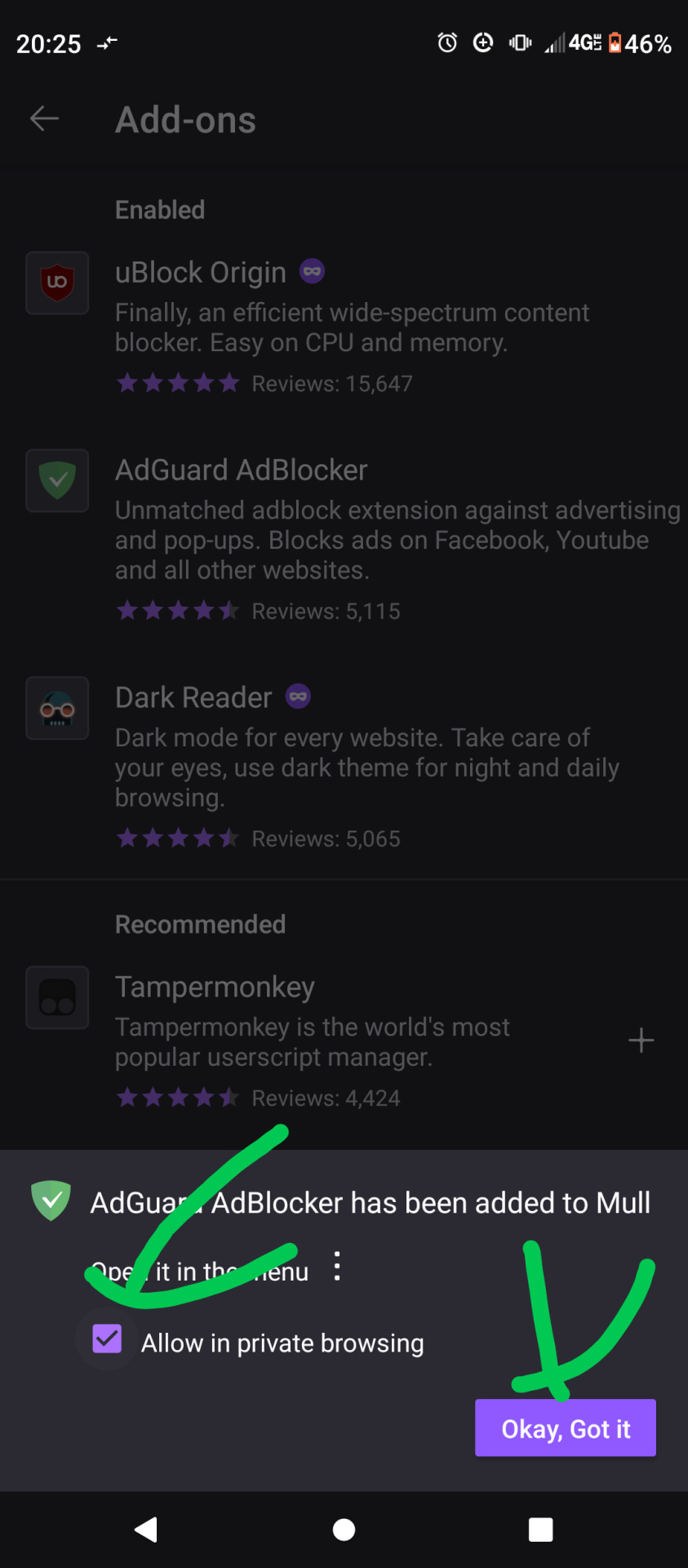
and thats all you need to have a great browsing experience on the web. tune in next time where i explain revanced, aka how you can improve almost every single social media app ever (sadly excluding our very own tumblr, for now) (NOT ANYMORE! revanced works with tumblr now) especially youtube, for which dns adblocking doesnt work and the mobile browser experience can be described as "not the best"
edit:
#o#t#i#x#adblock#adblocker#adblocking#<- look at me using tags for their intended purpose#what a discrace i have become
13 notes
·
View notes
Text
PIA Latest Features and Offers March 13, 2025!
youtube
#homepageexplorer#VPN#OnlinePrivacy#Cybersecurity#DigitalFreedom#PIAVPN#SecureBrowsing#StreamingVPN#NoLogs#FastVPN#AdBlocking#MalwareProtection#RemoteWork#TravelSecurely#Youtube
0 notes